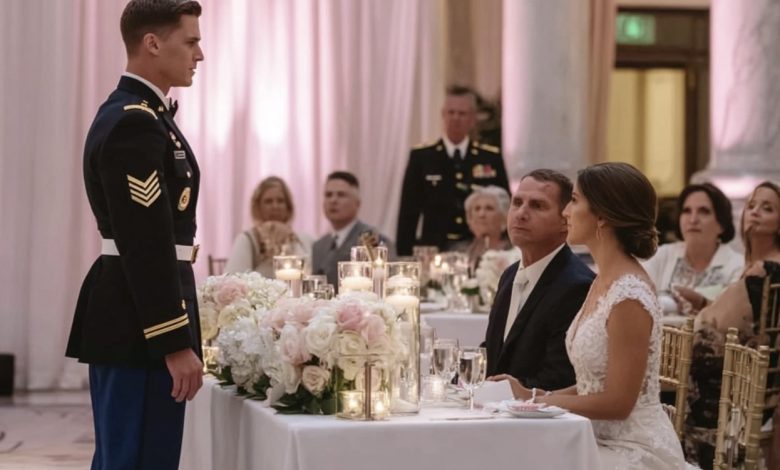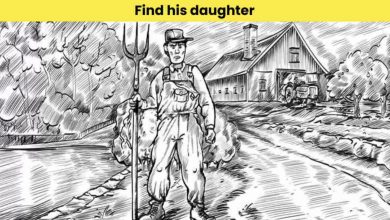“They Mocked Her as ‘Just a Gate Guard,’ but the Major Rose and Proclaimed, ‘She’s Mine’”

My name is Laya, and for nearly all of my twenty-eight years, I have never felt truly cherished by my own family. They loved someone else more. Not me.
From the day she was born, my older sister Marissa was the star of our household. She arrived first, with wide eyes and a loud cry, and instantaneously became the center of attention. Everything she did was praised. Every misstep was excused. She was the one who could do no wrong. Our mother, Dedra, and my father treated her like a precious treasure. Meanwhile, I was the quiet, bookish child with sharp grades and a calm voice—hardly worth a second glance. If I brought home A’s, the response was a polite, “Good job, dear.” If Marissa managed barely passing marks, Mom stormed into the school, demanding a retest. I learned early that in our home, love came from drama, from noise, from carved-out importance. I was neither loud nor dramatic, so I was invisible.
When I turned seventeen, I made a decision that surprised everyone: I joined the military. I didn’t say a word until I had already passed my exams and was weeks away from shipping out. When I finally told my mother, she looked as though I’d shared news of joining a traveling circus. “What do you think you’ll even do there?” she scoffed. “Take notes for the officers? Organize their papers?” Marissa joined in the laughter. “She’ll be begging to come home in two weeks,” she predicted with a sneer.
Despite their doubts, I stayed for six full years. I started in basic security, checking IDs and patrolling checkpoints, then moved into operations where I learned to coordinate threat responses, schedule transport, and handle sensitive clearances at a guarded site. I found pride in my work, but to my family, I was still “just the gate guard”—as if keeping a door secure held no value.
After four years overseas, I flew back home for Christmas. I looked forward to a quiet visit, but the holiday buzz was all about Marissa’s engagement to Major Landon. “She’s finally landed someone in uniform who wears it with dignity,” my mother gushed, glancing at me as if to say, “Not you, of course.” I arrived in my dress blues that day; they looked at me as though I had on a costume rented from a theater.
When they learned that I held a security clearance and had handled real classified work, they giggled. “So you just swipe a card at a warehouse door?” Marissa joked. Mom patted my hand patronizingly. “Don’t pretend it’s important, honey. We all know real women have real careers”—meaning Marissa, who organized decorative weddings online using images she didn’t even take herself. I kept quiet. My cousin once told me that if you want peace, you learn to swallow insults.
The true humiliation came at the wedding itself. I didn’t want to go—past trips home taught me how small I felt in that room—but a note from my father asking “Please be there. You’re still her sister” changed my mind. So I showed up early, quietly guiding guests to seats, fixing a toppled centerpiece, watching the event staff nod and smile as if I were part of the furniture. At the reception, I was sent to a table at the back. Two little cousins tossed peas at each other across the tablecloth. Up front, Marissa and her new fiancé glowed under spotlights. I was content to be unseen. I had been unseen my whole life.
Then came the speeches. The best man shared a few jokes, and the crowd clapped politely. Next, Marissa rose, her champagne flute glinting. She scanned the room until her gaze landed on me.
“And I have to say thanks to my little sister, Laya, for traveling all the way here from…wherever she is stationed now. She’s just a gate guard,” she announced, her voice dripping with condescension. “Seriously, who’d want someone whose job is to stand at a door?”
The room roared with laughter—harsh, piercing laughter that felt like a thousand tiny knives. The walls closed in on me. I forced my smile to stay polite, but I felt bile rising.
My mother chimed in, glass raised in mock salute: “She’s the disgrace of our family. What a tragedy.”
They laughed again. My face grew hot. I stared at my plate, looking nowhere else, breathing shallowly, willing my body not to betray the crack in my composure. I slipped out of my chair, ready to run away into the night.
That’s when I heard a chair scrape—sharp against the wooden floor. I looked up. Major Landon was on his feet. The happy groom I had seen moments before was gone. His smile had hardened into resolve.
He walked across the room, each step slow and measured, until he stood at my side. He placed a hand on my shoulder, light but firm, and faced the crowd.
“Actually,” he said, his voice calm but carrying weight like thunder, “she’s the reason I’m still alive.”
The room fell into stunned silence. All eyes turned to us. I felt my heart pounding so loud I was sure they could hear it. Landon took a breath and spoke again, his tone steady.
“You all call her a ‘gate guard’ like it’s something to deride. But let me tell you what that means. I was deployed in Afghanistan, in Kandahar, on an intel mission. My unit was moving through hostile territory. We walked into an ambush. Bullets flew, grenades exploded. In ten minutes, we lost three good men. I took shrapnel to my shoulder and could barely stay on my feet. I thought I was going to die in that dust and blood.”
My chest tightened, and memories came rushing back: the roar of the helicopters, the taste of metal in my mouth, the frantic calls for evac.
Landon paused, looked at me, and continued: “Laya didn’t flinch. She coordinated our extraction under enemy fire. She directed the medevac chopper, calling in coordinates, sending help. While bullets whizzed past, she got two of my brothers out safely. And she got me onto that last chopper when everyone else had written me off.”
Murmurs rippled through the guests. Some covered their mouths in shock. Others stared in stunned respect.
Landon’s voice grew stronger. “She didn’t just guard a gate. She stood between life and death, and every time she wore that uniform, she carried not just a door’s badge, but the lives of her comrades. She saved my life. She saved my family from a folded flag and a final letter of condolence.”
I felt tears sting my eyes. My throat tightened around words I didn’t have.
Then he turned toward Marissa, who looked as though the ground had opened beneath her feet. “You know, Marissa, I never thought I’d marry someone who cared only about appearances. I went along with this wedding because I convinced myself I loved you. But what I loved was the idea of being seen as someone important—a major with a pretty wife by his side. But the woman who truly serves? I laughed at her too, in that moment. And I hate myself for it.”
He faced the crowd once more. “We all see what is easy to see: fancy dresses, groom in his dress blues, a wedding cake. But I see the woman who wakes up every day, stands guard, makes sure strangers in uniforms don’t lose their lives. That’s real service.”
He turned back to me and extended his hand. “Come with me, Laya.”
Time seemed to slow. My mother’s wine glass shuddered and crashed to the floor behind me. I looked over my shoulder just in time to see Dedra’s face turn white. She sank into her chair, her lips moving soundlessly. Marissa rose unsteadily, her face drained of color, and then collapsed to her knees, her wedding dress billowing around her.
Bridesmaids rushed forward, but their frantic whispers felt distant. All I heard was Landon’s steady voice saying, “Take my hand.”
I froze for a heartbeat, then reached out. His hand closed around mine. Together, we walked through the stunned guests, past the overturned chairs and the fallen glass, out into the crisp night air.
We didn’t hurry. We didn’t run. We simply moved side by side, leaving behind the lies and the laughter that cut so deep. I felt his grip, warm and real, and I realized something: I didn’t need him to rescue me. I could have walked out on my own. But I chose to leave with him, because I wanted someone beside me who truly saw me.
We reached my rental car. We sat for a moment in silence. Then he reached over and touched my hand.
“You okay?” he asked softly.
I drew a slow breath and let it out. “I think I’m going to be,” I replied. It was the first time I had said those words and meant them.
In the days that followed, my family unraveled. My mother texted me: “You ruined your sister’s wedding.” Later: “You should be ashamed of yourself.” I read them, then closed my phone. I refused to reply. My father emailed, begging for calm. I wrote back that I was tired of peacemaking for people who never fought for me.
Marissa didn’t reach out. Word spread that Landon called off the engagement the very next day. Videos of his speech went viral. Strangers praised him. Others shamed her. Comments appeared online: “About time someone stood up for that brave woman.” “Gate guard? More like guardian angel.”
As for Landon and me, we moved at a slow pace. We spoke honestly, laughed when something was truly funny, and sat together in comfortable silence when words weren’t needed. A few months later, I got a new assignment at a different base. Landon drove across the country to help me settle in. He carried boxes, set up furniture, and occasionally paused just to look at me and smile.
During a break, he told me, “You are the first person who made me want to stand up in front of a room full of people and risk everything.”
I smiled back, feeling warmth in my chest. “Funny,” I said, “you’re the first person who made me believe I didn’t have to fight alone.”
I have since gone low-contact with my family. My mother still sends sharp emails, and Marissa’s name is one I only whisper when I’m speaking about the past. I don’t hate them—I just understand they never recognized my worth, and that’s not something I can fix. Some people never see the value in another’s life, no matter how clear it shines.
That night at the wedding was the moment everything changed. The girl they sneered at—the “gate guard”—walked away with her head held high. She walked away with her dignity, her truth, and with someone who truly loved her for who she is. And she never looked back.










